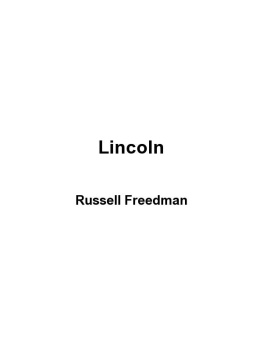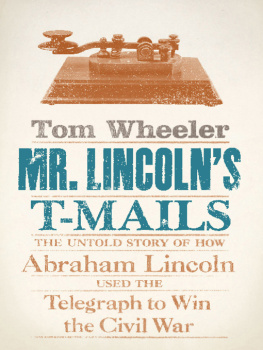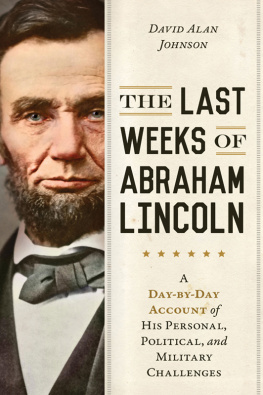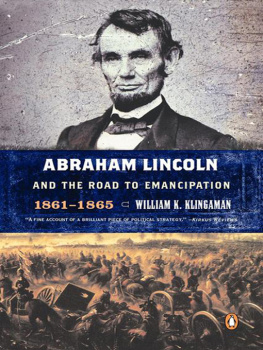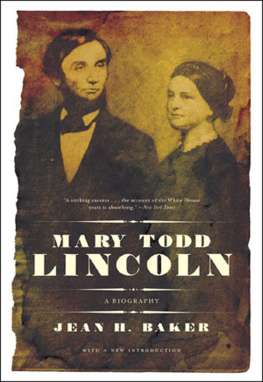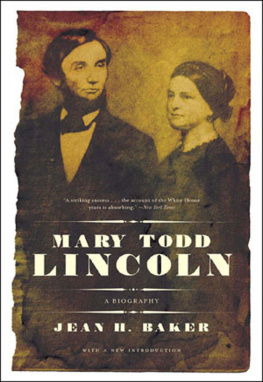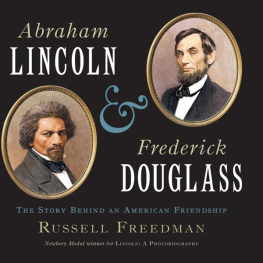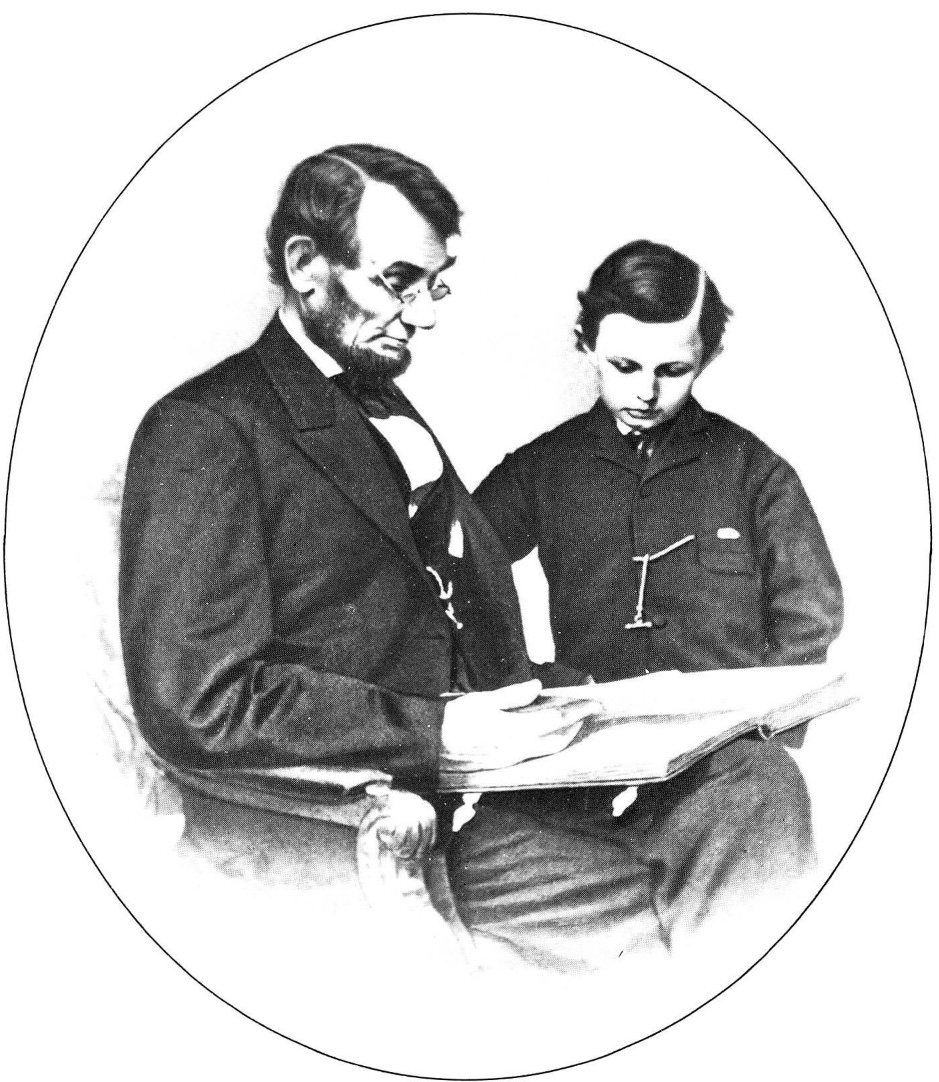
Lincoln and his son Tad, 1864.
.
Clarion Books
a Houghton Mifflin Company imprint
215 Park Avenue South, New York, NY 10003
Copyright 1987 by Russell Freedman
All rights reserved.
For information about permission to reproduce
selections from this book, write to Permissions,
Houghton Mifflin Company, 215 Park Avenue South, New York, NY 10003.
Book design by Sylvia Frezzolini
Printed in Singapore
Library of Congress Cataloging-in-Publication Data
Freedman, Russell. Lincoln.
Bibliography: p. Includes index. Summary: Photographs and text trace the life of the Civil War President.
1. Lincoln, Abraham, 18091865Juvenile literature. 2. PresidentsUnited StatesBiographyJuvenile literature.
[1. Lincoln, Abraham, 18091865. 2. Presidents] I. Title.
E457.905.F73 1987 973.7'092'4 [B] [92] 86-33379
ISBN 0-89919-380-3 PA ISBN 0-395-51848-2
TWP 40 39 38 37 36 35 34
F OR E VANS
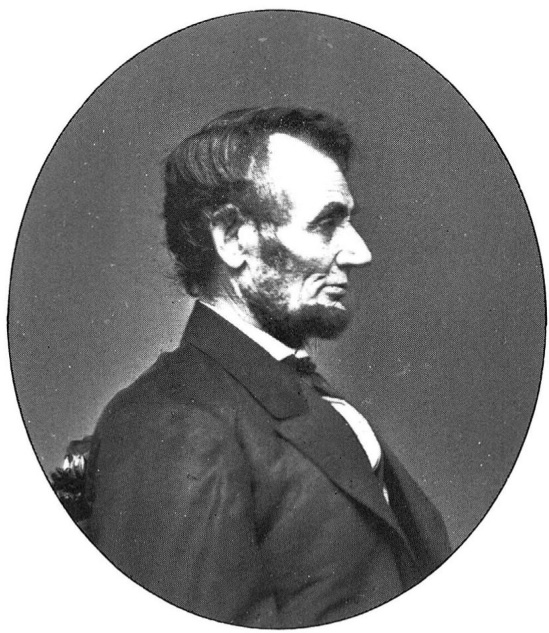
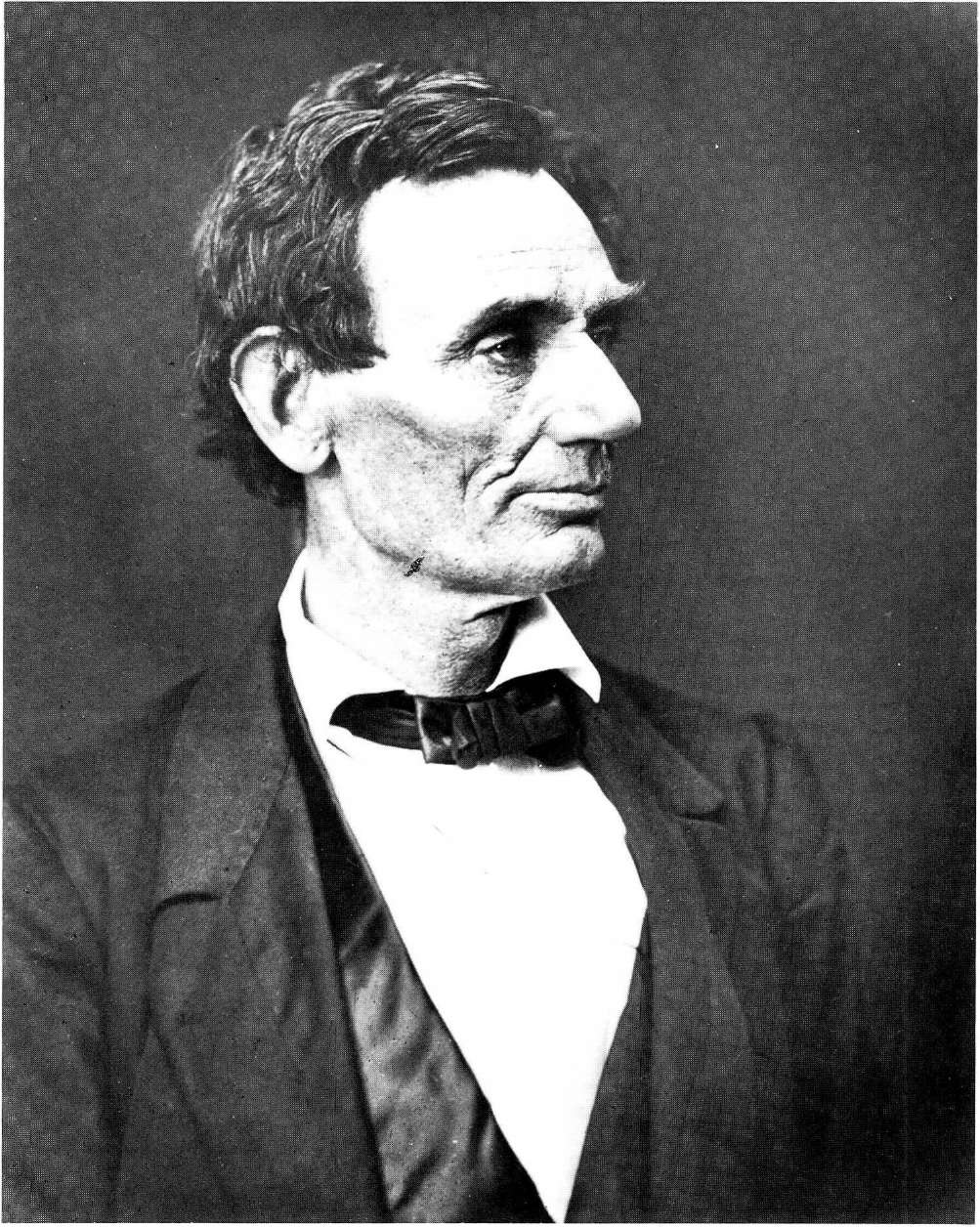
The presidential candidate, June 1860. Of this photograph Lincoln said, "That looks better and expresses me better than any I have ever seen; if it pleases the people, I am satisfied."
ONE
The Mysterious Mr. Lincoln
"If any personal description of me is thought desirable, it may be said, I am, in height, six feet, four inches, nearly; lean in flesh, weighing, on average, one hundred and eighty pounds; dark complexion, with coarse black hair and grey eyesno other marks or brands recollected."
Abraham Lincoln wasn't the sort of man who could lose himself in a crowd. After all, he stood six feet four inches tall, and to top it off, he wore a high silk hat.
His height was mostly in his long bony legs. When he sat in a chair, he seemed no taller than anyone else. It was only when he stood up that he towered above other men.
At first glance, most people thought he was homely. Lincoln thought so too, referring once to his "poor, lean, lank face." As a young man he was sensitive about his gawky looks, but in time, he learned to laugh at himself. When a rival called him "two-faced" during a political debate, Lincoln replied: "I leave it to my audience. If I had another face, do you think I'd wear this one?"
According to those who knew him, Lincoln was a man of many faces. In repose, he often seemed sad and gloomy. But when he began to speak, his expression changed. "The dull, listless features dropped like a mask," said a Chicago newspaperman. "The eyes began to sparkle, the mouth to smile, the whole countenance was wreathed in animation, so that a stranger would have said, 'Why, this man, so angular and solemn a moment ago, is really handsome!'"
Lincoln was the most photographed man of his time, but his friends insisted that no photo ever did him justice. It's no wonder. Back then, cameras required long exposures. The person being photographed had to "freeze" as the seconds ticked by. If he blinked an eye, the picture would be blurred. That's why Lincoln looks so stiff and formal in his photos. We never see him laughing or joking.
Artists and writers tried to capture the "real" Lincoln that the camera missed, but something about the man always escaped them. His changeable features, his tones, gestures, and expressions, seemed to defy description.
Today it's hard to imagine Lincoln as he really was. And he never cared to reveal much about himself. In company he was witty and talkative, but he rarely betrayed his inner feelings. According to William Herndon, his law partner, he was "the most secretivereticentshut-mouthed man that ever lived."
In his own time, Lincoln was never fully understood even by his closest friends. Since then, his life story has been told and retold so many times, he has become as much a legend as a flesh-and-blood human being. While the legend is based on truth, it is only partly true. And it hides the man behind it like a disguise.
The legendary Lincoln is known as Honest Abe, a humble man of the people who rose from a log cabin to the White House. There's no doubt that Lincoln was a poor boy who made good. And it's true that he carried his folksy manners and homespun speech to the White House with him. He said "howdy" to visitors and invited them to "stay a spell." He greeted diplomats while wearing carpet slippers, called his wife "mother" at receptions, and told bawdy jokes at cabinet meetings.
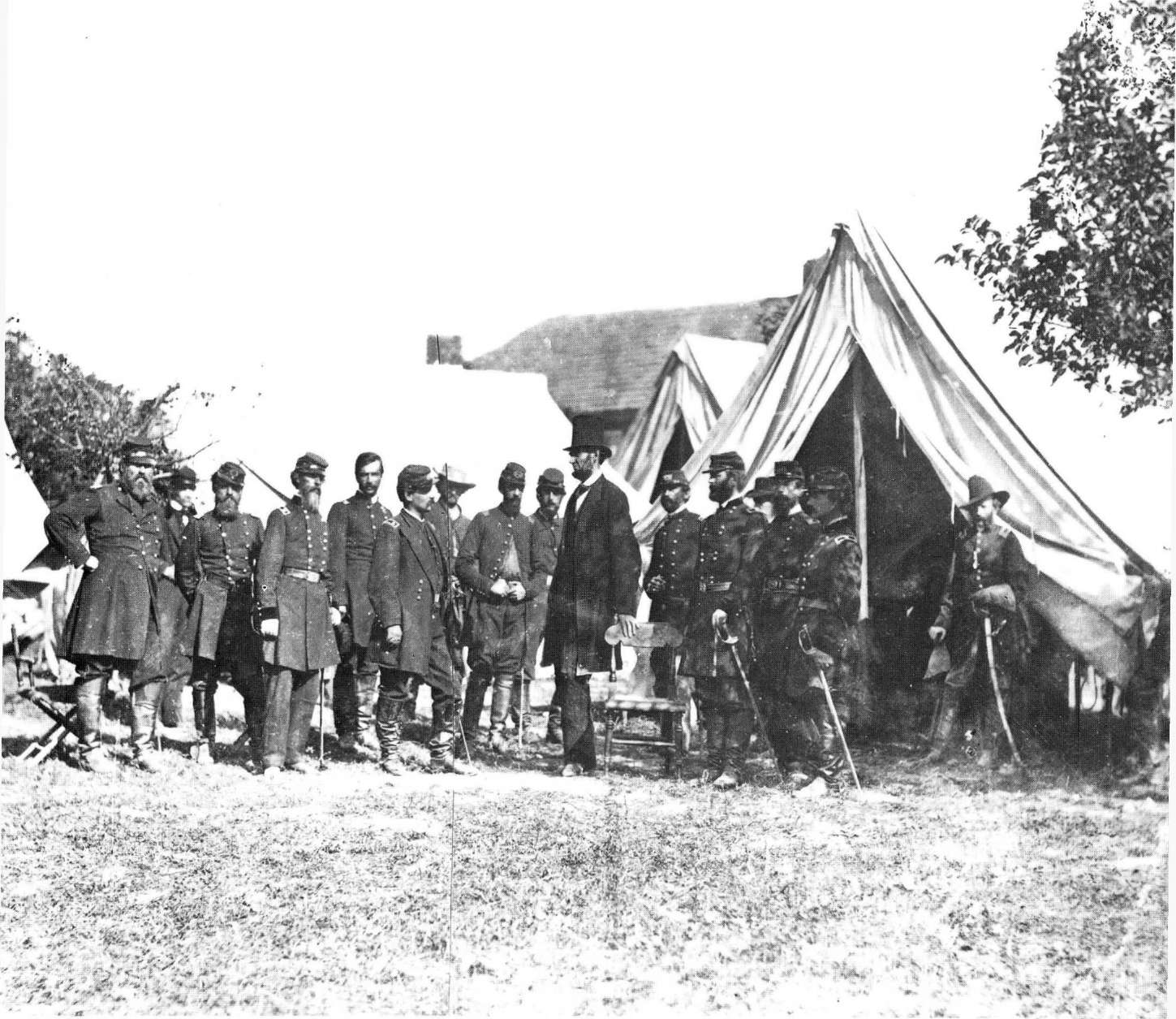
Wearing his familiar stovepipe hat, Lincoln towers above General George B. McClellan and his staff during a visit to Fifth Corps headquarters near Sharpsburg, Maryland, October 3,1862.
Lincoln may have seemed like a common man, but he wasn't. His friends agreed that he was one of the most ambitious people they had ever known. Lincoln struggled hard to rise above his logcabin origins, and he was proud of his achievements. By the time he ran for president he was a wealthy man, earning a large income from his law practice and his many investments. As for the nickname Abe, he hated it. No one who knew him well ever called him Abe to his face. They addressed him as Lincoln or Mr. Lincoln.
Lincoln is often described as a sloppy dresser, careless about his appearance. In fact, he patronized the best tailor in Springfield, Illinois, buying two suits a year. That was at a time when many men lived, died, and were buried in the same suit.
It's true that Lincoln had little formal "eddication," as he would have pronounced it. Almost everything he "larned" he taught himself. All his life he said "thar" for there, "git" for get, "kin" for can. Even so, he became an eloquent public speaker who could hold a vast audience spellbound, and a great writer whose finest phrases still ring in our ears. He was known to sit up late into the night, discussing Shakespeare's plays with White House visitors.
He was certainly a humorous man, famous for his rollicking stories. But he was also moody and melancholy, tormented by long and frequent bouts of depression. Humor was his therapy. He relied on his yarns, a friend observed, to "whistle down sadness."
He had a cool, logical mind, trained in the courtroom, and a practical, commonsense approach to problems. Yet he was deeply superstitious, a believer in dreams, omens, and visions.
We admire Lincoln today as an American folk hero. During the Civil War, however, he was the most unpopular president the nation had ever known. His critics called him a tyrant, a hick, a stupid baboon who was unfit for his office. As commander in chief of the armed forces, he was denounced as a bungling amateur who meddled in military affairs he knew nothing about. But he also had his supporters. They praised him as a farsighted statesman, a military mastermind who engineered the Union victory
Lincoln is best known as the Great Emancipator, the man who freed the slaves. Yet he did not enter the war with that idea in mind. "My paramount object in this struggle is to save the Union," he said in 1862, "and is not either to save or destroy slavery." As the war continued, Lincoln's attitude changed. Eventually he came to regard the conflict as a moral crusade to wipe out the sin of slavery.
Next page
